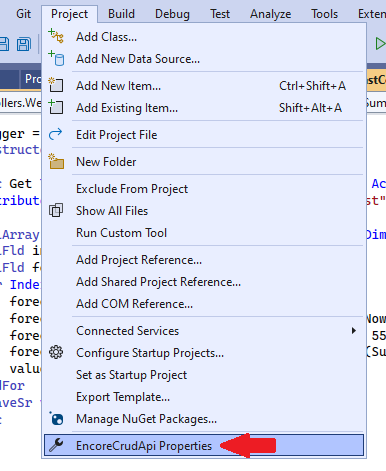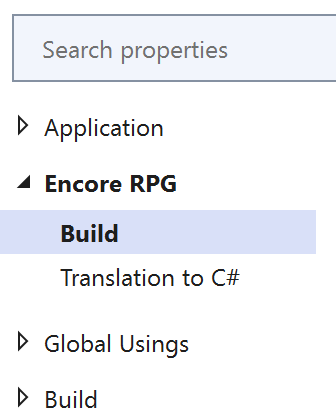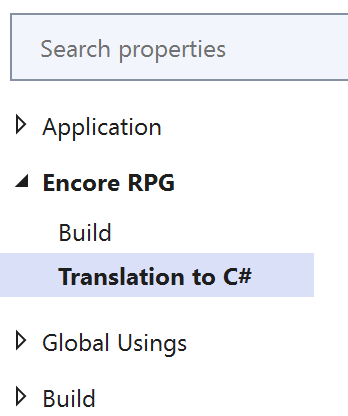Encore Project Configuration
Estimated reading time: 7 minutes
Encore SDK and Encore compiler provide several options for use in special cases. Many of these can be configured in Visual Studio project settings exposed by the Project Properties window.
Encore-specific properties are presented in two sections in the Encore RPG section of the Project Properties: Build and Translation to C#. Links to each section are visible the left margin of the Project Properties window under Encore RPG.
To open Project Properties use the “<project name> Properties” command on the Visual Studio Project menu:

Encore RPG Build Options
These options effect the behavior of, and code generated by Encore compiler.

Additional Database Name File
Default Value: (not specified).
MSBuild Property: <AdditionalDBNamesFile/>
When specified, the compiler looks in the given secondary file location for available database name information.
Encore database names are constant string aliases for DataGate database connection parameter sets. They are specified in Encore statements, such as the
DBNAMEkeyword ofDCLDB.
Encore compiler first searches for referenced database names in the primary database names file. The primary file resides in the logged-on user’s “local app data,” identified as %LOCALAPPDATA%\ASNA\DataGate\asnasettings.json. Thus if “Bob” is the logged-on user, the primary file path typically resolves to C:\Users\Bob\AppData\Local\ASNA\DataGate\asnasettings.json.
Note that .NET configuration data is gathered cumulatively, meaning that typed connection parameters of a database name defined in the primary
asnasettings.jsonfile will be overridden by same-typed connection parameters of the same database name appearing in the secondary file (if specified). After the primary and secondary files are visited, any build-time user secrets, project secrets, and environment variables are examined to compose the final set of database names available to the compiler.
As an example usage, setting this option as shown below allows the secondary database names file to reside in the source control repo containing the project:

Any file containing valid JSON-encoded text may be specified here. Database names in the file must be defined using the ASNA DataGate “sources” JSON schema. When set in the Project Properties window, the value may be set per project configuration, e.g. Debug|AnyCPU.
Note that in the above example, the
appsettings.jsonfile is specified, typically found in ASP.NET-related projects as a general settings file.
Enable File Definition Cache
Default Value: False (disabled).
MSBuild Property: <UseFileDefinitionCache/>
When enabled, each compilation will use the Encore SDK externally-described file cache feature, which may improve overall build performance in large solutions and when accessing databases with high response latency.
Note: this feature should only be used with an understanding of its potential side-effects. Please see File Definition Caching before enabling this feature.

When set in the Project Properties window, the value may be set per configuration, e.g.
Debug|AnyCPU.
File Definition Cache Location
Default Value: $(LOCALAPPDATA)\ASNA\DataGate\caching
MSBuild Property: <FileDefinitionCacheRoot/>
This option is only visible in Project Properties when the File Definition Cache option is enabled.
Specifies the folder containing file definition cache. See File Definition Caching for more details. The Open file definition cache folder hyperlink appears as shown below, allowing immediate inspection of the designated folder using the system file browser.

In development builds and almost all other cases, the default value is recommended.
The folder specified here should be reserved for the exclusive use of the Encore build.
Run-time Arithmetic Overflow/Underflow
Default Value: False (disabled).
MSBuild Property: <CheckForOverflowUnderflow/>
When enabled, the compiler generates run-time checks for overflow and underflow conditions in arithmetic operations.
This option is identical to a similar option also shown in the Build/Advanced section of Project Properties.
Default DATEDIT Format
Default Value: Unspecified (resolves to *NONE).
MSBuild Property: <DatEdit/>
Specifies one of four values to use as the format that would otherwise be specified by DATEDIT in edit code Y expressions when the DATEDIT keyword is omitted.
*YMDYear, Month, Day*MDYMonth, Day, Year*DMYDay, Month, Year*NONE

When
*NONE, the compiler uses a contextual default value, which typically resolves to*YMD.
Translation to C# Options
The options in this section are relevant only to the behavior of the Translate to C# Project migration command.

Translation Output Folder
Default Value: $(MSBuildProjectDirectory)_CS
MSBuild Property: <TrekkerOutput/>
Defines the folder to contain the migrated C# project generated by the Translate to C# Project command.

The folder may or may not exist at the time the command is invoked. If the folder exists and is non-empty, the command’s behavior is dictated by the Overwrite Output Folder option.
Overwrite Output Folder
Default Value: False (disabled).
MSBuild Property: <Overwrite/>
When enabled, the contents of the translation output folder are removed before the Translate to C# Project command is invoked. If this option is disabled and the folder is non-empty, the command will not produce the translation, and an error will be shown in the Output Window build log and Error List.

Character Replacement Option File
Default Value: Unspecified.
MSBuild Property: <TrekkerOptions/>
Pathname of an XML file containing character mappings used by the Translate to C# Project command.

Miscellaneous Options
Many more generic .NET application properties are available in other areas of Project Properties. The Search text box in this window is helpful for finding a property of interest. The next sections provide links to help get you started.
Project Properties UI
Project Properties, also known as the .NET Project Designer, exposes many more options common to most .NET SDK-based projects. Some of these have no bearing on Encore projects however:
- Application Settings
- Resources and Manifests
- General Build Settings
- Warnings and Errors
- Debug Settings
MSBuild Project Properties
MSBuild is the underlying build engine for all .NET SDK projects including Encore. It provides many more properties, targets, and tasks to cover almost any .NET development scenario.
Additional Information
Find out about the new Language Concepts when using Encore RPG.
Describes the Encore RPG programming language reference.
Getting Started with Visual Studio
Learn to code in Visual Studio
IntelliSense® is a registered trademark of Microsoft Corp.